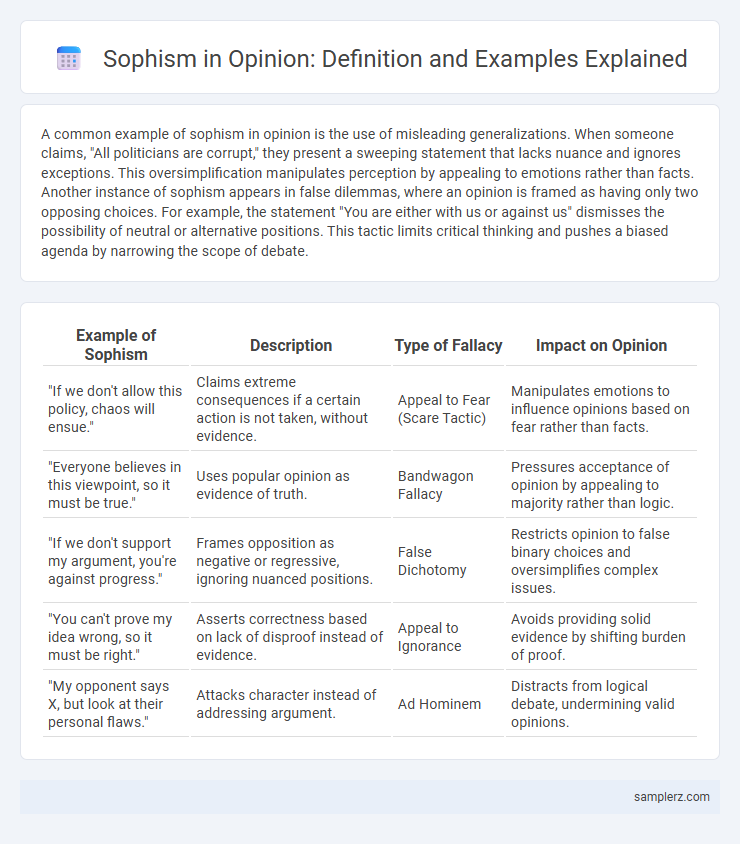A common example of sophism in opinion is the use of misleading generalizations. When someone claims, "All politicians are corrupt," they present a sweeping statement that lacks nuance and ignores exceptions. This oversimplification manipulates perception by appealing to emotions rather than facts. Another instance of sophism appears in false dilemmas, where an opinion is framed as having only two opposing choices. For example, the statement "You are either with us or against us" dismisses the possibility of neutral or alternative positions. This tactic limits critical thinking and pushes a biased agenda by narrowing the scope of debate.
Table of Comparison
| Example of Sophism | Description | Type of Fallacy | Impact on Opinion |
|---|---|---|---|
| "If we don't allow this policy, chaos will ensue." | Claims extreme consequences if a certain action is not taken, without evidence. | Appeal to Fear (Scare Tactic) | Manipulates emotions to influence opinions based on fear rather than facts. |
| "Everyone believes in this viewpoint, so it must be true." | Uses popular opinion as evidence of truth. | Bandwagon Fallacy | Pressures acceptance of opinion by appealing to majority rather than logic. |
| "If we don't support my argument, you're against progress." | Frames opposition as negative or regressive, ignoring nuanced positions. | False Dichotomy | Restricts opinion to false binary choices and oversimplifies complex issues. |
| "You can't prove my idea wrong, so it must be right." | Asserts correctness based on lack of disproof instead of evidence. | Appeal to Ignorance | Avoids providing solid evidence by shifting burden of proof. |
| "My opponent says X, but look at their personal flaws." | Attacks character instead of addressing argument. | Ad Hominem | Distracts from logical debate, undermining valid opinions. |
Common Examples of Sophism in Everyday Opinions
Common examples of sophism in everyday opinions include false dilemmas, where complex issues are presented as having only two opposing choices, and ad hominem attacks that target the person rather than addressing the argument. Another frequent sophism is the appeal to ignorance, which asserts a claim is true simply because it has not been proven false. Such logical fallacies distort rational debate and undermine the integrity of opinions in daily discussions.
Spotting Sophistry in Public Discourse
Sophistry in public discourse often manifests as deliberate use of misleading arguments that appear plausible but lack sound reasoning. Spotting sophistry involves critically analyzing claims for logical fallacies such as false dilemmas, straw man arguments, or equivocation. Recognizing these deceptive tactics enhances informed decision-making and promotes clearer communication in debates and media narratives.
Classic Opinion-Based Sophisms Explained
Classic opinion-based sophisms often present arguments that appear persuasive but rely on flawed logic or emotional appeal instead of factual evidence. A prominent example is the appeal to popularity, which asserts that a belief is true simply because many people accept it. Another common sophism is the false dilemma, which limits choices to two extremes, ignoring viable alternatives in opinions or arguments.
How Sophisms Shape Our Personal Beliefs
Sophisms manipulate logical fallacies to convincingly distort truth, influencing how individuals form and justify their personal beliefs. By appealing to emotions or misleading reasoning, these deceptive arguments embed false convictions into everyday opinions. This subtle shaping of belief systems often prevents critical evaluation and promotes acceptance of flawed ideas as undeniable truths.
Political Opinions and the Use of Sophistry
Political opinions often fall prey to sophistry when rhetoric disguises flawed reasoning as truth, manipulating public perception through emotionally charged but logically weak arguments. Politicians may employ sophisms such as false dilemmas or appeals to ignorance to sway voters without addressing substantive policy issues. Recognizing these tactics requires critical analysis of arguments beyond their persuasive language, emphasizing evidence-based evaluation over emotional appeal.
Social Media: A Hub for Opinionated Sophisms
Social media platforms frequently amplify sophisms by enabling users to share opinionated content that often relies on emotional appeals rather than factual accuracy. Echo chambers and algorithm-driven content feeds exacerbate confirmation bias, making it easier for fallacious arguments, such as false dilemmas or ad hominem attacks, to proliferate unchecked. This environment fosters a culture where sophistic rhetoric can overshadow rational discourse and critical thinking.
Debunking Popular Sophisms in Modern Debates
Many modern debates are riddled with sophisms such as straw man arguments, where opposing views are deliberately misrepresented to make them easier to attack. False dilemmas frequently appear, forcing a choice between limited options when multiple alternatives exist. Recognizing these fallacies is crucial for fostering rational discourse and avoiding manipulated opinions.
When Personal Opinions Become Sophistic Arguments
Personal opinions transform into sophistic arguments when they rely on emotional appeal rather than logical reasoning, undermining objective analysis. Examples include using anecdotal evidence or appealing to popular beliefs to dismiss opposing views without substantial proof. This shift from reasoned debate to fallacious persuasion distorts constructive discourse and hinders critical thinking.
The Influence of Sophism on Groupthink
Sophism significantly fuels groupthink by promoting rhetoric that masks weak arguments as sound reasoning, leading to collective acceptance of false or misleading ideas. This manipulation often results in a homogenized group perspective where critical analysis is suppressed, diminishing diversity of thought. Consequently, sophistic techniques undermine decision-making processes, fostering conformity over evidence-based conclusions.
Recognizing Sophistry in Influential Opinion Pieces
Influential opinion pieces often employ sophistry by presenting misleading arguments that exploit emotional appeal rather than factual evidence. Recognizing sophistry involves critically analyzing the logical consistency and verifying the authenticity of claims made by prominent authors or media outlets. Sophistic techniques such as straw man arguments, false dilemmas, and equivocation undermine genuine discourse and distort public understanding.

example of sophism in opinion Infographic
 samplerz.com
samplerz.com